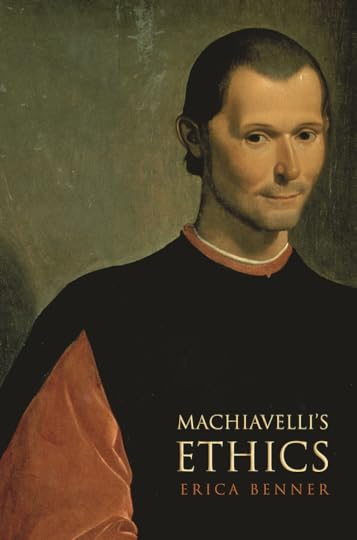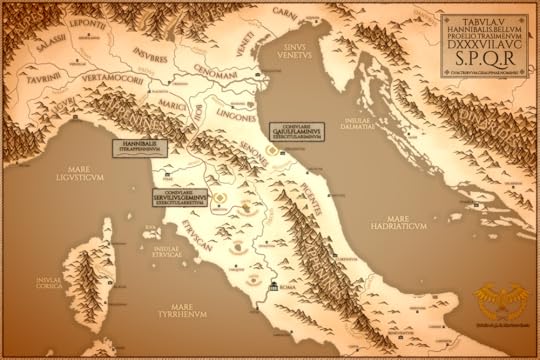Cary Reed's Blog: The Reed Pen
July 3, 2024
Navigating the Complexities of Masculinity in Historical Fiction
The last book in my Palladium Trilogy is shaping up to be a deep dive into the concept of legacies—how our words, actions, and the examples we set influence our contemporaries and the next generation. I aim to explore how characters like Varro, Cato, Scipio, and Aemilia affect their families, friends, and wider Roman society.
A new character, Lucius Aemilius Paulus, becomes a focal point in this exploration. Lucius is the teen son and namesake of the consul killed at Cannae, and he is also Aemilia's younger brother and Scipio's brother-in-law. As he matures, Lucius faces the challenge of becoming a man without a father to guide him—a difficult path for anyone, even one from a rich and powerful family like his.
Our understanding of Roman masculinity is nuanced and often imperfect, providing ample room for artistic interpretation. Traditionally, Roman masculinity involved studying and practicing virtues such as physical and moral courage, honor, and a sense of civic duty. However, the tumultuous times during which Lucius comes of age complicate this picture.
The Rome in my first two books in this series is a society in turmoil. The elites repeatedly failed to address the threat posed by Hannibal, exacerbating existing economic upheaval caused by the displacement of small farmers by slave labor. This economic shift led to widespread resentment among the common people, who viewed the elites as responsible for their hardships. Additionally, the advancement of women's rights and increasing immigration to the city, both from the countryside and poorer nations, created further social upheaval.
The resentment towards the elites extended to the virtues they upheld. In the eyes of the common people, these virtues—physical and moral courage, honor, and civic duty—became tainted by association with the elites who had failed them. As a result, these virtues were often perverted. For instance, Varro, a coward, and his supporters twisted the concept of courage to justify his actions, calling cowardice bravery. This sort of rationalizing often happens when resentments lead to motivated reasoning to resolve problems associated with cognitive dissonance. When you believe the "other side" is "evil," you excuse or rationalize extremism, excess, and otherwise inexcusible behavior on your own side (just as Nellie Bowles, a writer with great moral courage).
Lucius, like many of his fellow Romans, is filled with anger—anger at Varro for his father's death, and anger at Varro's supporters for their perversion of virtues. The critical question for Lucius is: what will he do with his anger? How he channels ir will be the most important determinant of the kind of man he will become.
Will he allow his anger to consume him and lead him down a path of destruction, or will he find a way to transform it into a force for positive change? This inner conflict mirrors the larger societal struggle in Rome—a society grappling with the meanings of honor, courage, and duty in a time of profound crisis.
As I continue to write the final installment of the Palladium Trilogy, I am deeply interested in how Lucius's journey will unfold. His story is not just about one young man's quest for identity and honor, but also a reflection on the complexities of masculinity in a changing world. Through Lucius and the other characters, I hope to offer a nuanced exploration of how we define and live out virtues in times of upheaval, and how our legacies are shaped by these choices.
November 28, 2023
Taming Inner Demons: The Heart of Storytelling
“It is only when a man tames his own demons that he becomes the king of himself if not of the world.” - Joseph Campbell
Joseph Campbell's profound understanding of mythology has been a beacon for storytellers across generations, including myself. His insights into the universal struggles of human nature are particularly resonant in the realm of fiction writing.

In my debut novel, "In the Shadow of the Furies," the protagonist, a young Scipio Africanus, grapples with the most formidable demon of all: fear. This journey mirrors Campbell's philosophy, wherein the conquest of personal demons is pivotal to a character's evolution.
I've always believed that labeling characters (or people for that matter) as simply 'evil' is not just limiting for storytelling but also a disservice to the complexity of human nature. In my stories, the antagonists aren't driven by a desire to wreak havoc on the world; instead, their actions stem from a misguided will to do good for themselves and those they care about, or to achieve what they think of as "justice."
The "demons" most featured in my writing are fear, greed, pride, and simplicity. These elements afflict both heroes and villains alike. A tragic hero succumbs to them, while others triumph over these challenges, one by one. In my book "Rings of Iron," for instance, the demon of simplicity, the allure of easy solutions to complex problems, is what ultimately tests the mettle of Rome. This simplicity, often manifested through a demagogue's rhetoric, is what the Republic needs to rid itself of. However, unlike Scipio, the Roman Republic, in history, emerges as a tragic hero, unable to overcome this critical flaw.
The influence of Campbell’s work extends beyond my writing. For example, George Lucas, when creating the Star Wars saga, drew heavily from Campbell’s concepts. Like Rome, the transformation of the Galactic Republic into the Empire in Star Wars is not a story of growth and expansion, but rather one of decline and fall—a theme echoing the tragic history of republic.
This exploration of inner demons, the personal struggles that define our character and decisions, is more than a narrative device. It’s a mirror held up to our own lives, challenging us to reflect on which demons we battle and how we choose to confront them. Whether in a galaxy far, far away or the streets of ancient Rome, the struggle remains universally compelling.
As Campbell himself might say, it’s in the taming of these inner demons that we truly find ourselves, emerging not just as rulers of our own destiny, but as creators of stories that endure across time.
October 29, 2023
The Perilous Allure of Demagogues: Lessons from Machiavelli to Modern Democracies
I've recently been engrossed in Erica Benner's "Machiavelli's Ethics," a book that sheds light on the political machinations of yesteryears and the timeless relevance they hold today. A quote that struck me was this:
Both sides invoke the good words republic, freedom, fatherland, and justice. Yet the Medicis and other tyranny-prone individuals who appear earlier in the work use them much more liberally to arouse popular passions, adding heavy doses of God and religion to their rhetoric.
It got me thinking about the notion of free speech in the context of our modern liberal democracies, and the precariousness that can arise when demagogues enter the public square.
The terminology of 'freedom,' 'justice,' and 'republic' have been generously applied throughout history, often by those who seek to subvert these very principles. In this way, ancient and Renaissance republics parallel our modern times, demonstrating an enduring vulnerability to charismatic individuals wielding these words like weapons.
As Ms. Benner's points out, Machiavelli himself exposed the fallacy that "extraordinary entrepreneurial princes" could rescue corrupt republics. As he astutely observed, these so-called saviors often usher in more strife and chaos than they resolve. In my own writing, I've explored similar themes. In my upcoming book Rings of Iron, for example, the Roman Republic narrowly survives one demagogue; but as well all know it eventually fell to another because it failed to inoculate itself against such figures.
So what safeguards us against the slide into authoritarianism? Contrary to popular belief, it's not the divisions among us that herald the downfall of republics. It's the loss of faith in our institutions, the abandonment of peaceful methods to bring change, and the insidious rise of violence—not necessarily from the government but from groups that aim to establish or maintain dominance.
The strongest defense, then, lies not in a citizenry armed with weapons, but in one equipped with the intellectual tools to dissect impassioned rhetoric and uncover underlying self-interest or flawed ideologies. In this light, our role as writers and thinkers is to contribute to this arsenal of critical thinking—to challenge, question, and most importantly, to foster an environment that scrutinizes ideas before adopting them.
Our hope lies not in avoiding divisions but in fortifying the institutions and principles that can withstand them. Let's remember that, lest we allow history's darker lessons to replay themselves in the chapters of our future.

October 14, 2023
The Ancient Wisdom of War and Peace: Why World Leaders Need a Lesson from Thucydides
In a world marred by conflict and divisiveness, it’s disheartening to note how little we've evolved when it comes to the wisdom of war and peace. One thing I love about writing, especially in the realm of historical fiction, is the ability to interweave ancient wisdom into modern narratives. Often, I find myself placing age-old truths in the mouths of my characters, in the hope that they resonate with readers today.
One ancient thinker whose wisdom always feels eerily relevant is Thucydides. He once pointed out that in war, action often precedes thought. It's a disturbing truth, confirmed over millennia, that we're quick to unleash violence and slow to consider the consequences.
...when people are entering upon a war they do things the wrong way round. Action comes first, and it is only when they have already suffered that they begin to think.
This sentiment finds an echo in the modern era through Robert McNamara, as captured in Errol Morris’s film "The Fog of War." McNamara urges us to think more about killing, echoing Thucydides in a way that drives home the timeless nature of this tragic human flaw. Both thinkers converge on a critical point: the need to put more thought into strategies that involve violence as a means to an end.
The paradox of violence is that even though it's often plotted by seemingly rational minds, it can quickly turn into an emotional and reflexive act. Those who orchestrate it often fail in a fundamental aspect: setting concrete, worthy goals that enable them to channel their power into long-lasting solutions. Instead, violence morphs into an end unto itself, a self-perpetuating cycle that brings more suffering than resolution.
This cycle isn't just a cautionary tale from ancient texts or the musings of historical figures; it’s a recurring problem we're grappling with today. In my writings, I often challenge my characters—and by extension, my readers—to think deeply about the choices they make, even if the "solution" seems obvious. Contrary to platitudes about the inability of violence to solve things, in international politics, it can, provided it is coupled with a great deal of strategic reasoning.
On the lighter side, I'm close to finishing Rings of Iron, the sequal to In the Shadow of the Furies. One of the parts of that book I loved the most were the maps, which were beautifully done by A.E. Charters. They exceeded my expectations, and I'm lucky that he was available to do them again. Here is one from the upcoming book.

October 7, 2023
Why I Write: In Defense of Virtue and Liberalism
Writing has always been more than a simple pastime for me; it's been a channel for my deepest passions and convictions. When I sat down to pen "In the Shadow of the Furies," my motivations were twofold.
Firstly, I wanted to rise to the defense of liberalism—a philosophy that, in my view, faces increasing threats both internationally and within our own borders. It felt crucial to contribute something, however small, to the preservation of values like democracy, free speech, and equal opportunity.
But my aspirations didn't stop at ideology. At a time when society is wrestling with what it means to be 'masculine,' I felt compelled to create a hero that embodied the positive aspects of masculinity. I wanted to challenge the dichotomy between the "man on a horse" populist figures who threaten democratic ideals and those who engage in toxic behavior towards women.
This is where Scipio Africanus comes into the picture. A figure both historical and larger-than-life, Scipio offers a compelling model of virtue and leadership. History that far back is always hazy, but as I write him, he's neither a tyrant nor a misogynist. He's far from perfect, and he'd be a pretty boring character if he was. But, I understand him as a man of principle and couragen. Through him, I explore what it means to be a truly great man in a world that desperately needs them.
September 25, 2023
Welcome to the Reed Pen!
Welcome to The Reed Pen, the official writing corner of Cary Reed. Here, you'll find a unique blend of ancient warfare and modern espionage as I take you behind the scenes of my two exhilarating series. Immerse yourself in the intricate worlds of Scipio Africanus and Hannibal Barca as they navigate the Second Punic War, and delve into the high-stakes operations of Janissary 12, a team of Cold War-era trainees turned mercenaries. From exclusive character profiles and historical deep-dives to writing tips and book updates, this blog is a treasure trove for fans and aspiring writers alike. So, pick your timeline—be it Carthaginian battlefields or covert operations in the late 90's—and let's embark on this literary journey together.
The Reed Pen
...more
- Cary Reed's profile
- 22 followers



